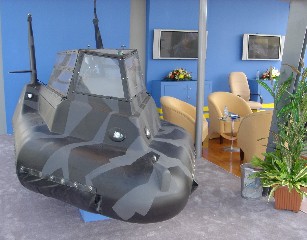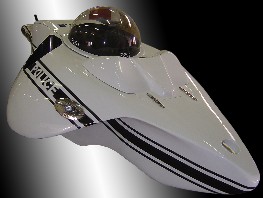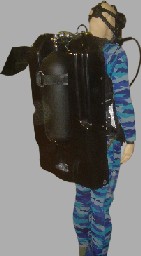|
When you have bought your luxury
villa on The Palm and need that ultimate status symbol
to set yourself apart from the Beckhams and Owens next
door, look no further than the Stingray – your own
personal submarine.
With a
starting price of US$37,000, the one and two-man subs
are being manufactured by Jebel Ali-based Palm
Submarines to appeal to the rich and famous who have
snapped up holiday homes on the world’s largest man-made
islands.
The
company, which was formed by the Dubai Ports, Customs
and Free Zone Corporation (PCFC) following the
acquisition of US-based Seahorse Submarines, plans to
build 1,000 of the mini-subs over the next five years
from a 50,000 square feet manufacturing facility in the
Jebel Ali Freezone.
The
company’s CEO, Herve Jaubert, who also founded Seahorse
Submarines, believes personal submarines will soon
replace yachts as the ‘ultimate must-have toy’ and
envisages dozens of Stingrays moored at the bottom of
the gardens of homes on The Palm, as well as other
luxury resorts around the world.
“I believe
the time will come when rich people will have their own
submarines, just as they have yachts now,” he says.
“People might get bored with a boat because it is pretty
much always the same, but with a submarine it is always
an adventure to actually dive under the water.
“If you are
living on one of The Palm islands, having a personal,
affordable, recreational submarine will be a great
thing. You can use it all the time as the weather is
beautiful, and it is always interesting and always
different.”
The
Stingray can dive to a depth of 130 feet and has a top
underwater speed of 3 mp/h, which makes it ideal for
exploring the artificial reefs and wrecks that have been
sunk around The Palm to attract fish and other marine
life to the area. And, like a jet-ski, the Stingray can
be loaded onto a trailer and doesn’t need a ‘mother
ship’ or any sort of support vessel to operate.
“Until now
all the manufacturers and designers of submersibles have
focussed on going deep,” says Mr Jaubert. “But I have
never believed there was a market for that - the market
is in shallow water submersibles. People don’t want to
go 300m down where it is dark and cold - they want to
dive in 50 feet of water because that is where you have
the richest marine life and it is safe. It is also less
expensive to build shallow water subs and there are less
regulatory requirements involved.”
Palm
Submarines currently has seven products in its range –
including the one and two-man Stingrays and a larger
submarine aimed at the leisure market, whereby tourists
will be able to take underwater tours in a ‘submersible
yacht’ capable of carrying 20 passengers.
“There is a
tremendous potential in this market,” Mr Jaubert says.
“I envisage some sort of franchising operation being
established whereby submarines operate from different
resorts offering one-hour guided tours, which would
include 35 minutes under the water.

“Over the
past 10 years, the number of people scuba diving has
levelled off. With the design of the submersible yacht
we are bringing a new adventure that will increase the
number of scuba divers because the concept now is to
dive with the boat.
“Until now
you put your gear on and jump in the water and then you
climb back into the boat afterwards. With the
submersible yacht you are in your seat and you go down
with the boat and then you move around. There are so
many people who want to go under the water, but they
don’t want to go through the scuba diving training and
certification so they will take rides in submarines
instead because it is easier to go underwater in a
submarine than in scuba gear.”
According
to Palm Submarines’ project manager, Sanil Mohd. Subair,
it was the development of the Atlantis resort on The
Palm, Jumeirah which prompted the Dubai Ports, Customs
and Free Zone Corporation to acquire Seahorse Submarines
and bring its submarine business to Dubai.
“The Atlantis project needed submarines because they are
going to develop a big underwater habitat, so we looked
at Seahorse Submarines and decided to develop that
business further as we saw a huge potential,” he says.
“Right now we are setting up a huge 50,000 square feet
manufacturing facility and are also developing a
separate training and testing facility.”
The company has also brought in Captain Don Walsh, one
of the legends of the submarine industry, to act as an
adviser and develop the company’s training programmes to
licence new submarine pilots.
Captain Walsh, along with Jacques Piccard, set the world
deep-diving record - 35,810 feet (seven miles) - in 1960
when they reached the bottom of the Challenger Deep in
the Pacific Ocean's Marianas Trench in an underwater
vessel called the Trieste. To date the record has never
been beaten, and no person has plunged to within 10,000
feet of it.
According to Mr
Jaubert,
the dynamic nature of the way business is done in Dubai
has opened up a world of new possibilities, with Palm
Submarines’ first two vessels having already been built
at a temporary manufacturing facility in Jebel Ali.
“The
submarine business is difficult because you have
obstacles,” he explains. “When you do something new, you
always have to face conservatives - people who don’t
know and you have to explain it to them. You have to
convince them, but here we have been able to move fast.
What we have achieved in the last two months would have
taken at least 6-12 months in any other country.”
The
establishment of Palm Submarines has also enabled the
development of the product range previously offered by
Seahorse Submarines, with the new company targeting
military, security and commercial customers, as well as
the leisure market.
As a former
Navy Commander with 15 years experience in the design,
development and use of Military Tactical Underwater
Craft with the French Special Forces, Mr Jaubert has a
unique insight into the specialised requirements of
military customers.
“It’s a
great business opportunity, and I believe there is a
tremendous market for our products,” he says. “The way I
built those submarines for recreational purposes makes
them unique in the market for military applications,
particularly as they are silent and have stealth
capabilities.

“They are
undetectable because of the way they are built and the
way you use them. It is very difficult to detect a
vessel in shallow water because of all the other
obstacles on the bottom of the sea. Equally, you are
protected from ships with sonar because they don’t have
access to the shallow water where you are operating.”
Among the
military applications the Stingray can be used for is
port patrol - checking for underwater threats to
warships docking in harbours - which, Mr Jaubert says,
will enable one submarine pilot to do the job of 15
divers.
Another of
the military products being developed by Palm Submarines
is the Swimmer Delivery Vehicle (SDV), which can
accommodate up to eight divers for missions requiring
stealth and speed. The SDV can submerge in seconds, and
reaches speeds of 25 knots on the surface and six knots
underwater using a hybrid petrol/electric propulsion
system. The SDV is light enough to be trailered and
beached, making it an ideal vehicle for swimmer
deployment, inspection, assault and intelligence
monitoring.
The company
also manufactures the Scuba Jet - a hands-free, low
profile diver propulsion vehicle in a self-contained
backpack configuration. Form-fitting to a diver’s back,
the Scuba Jet provides 90 minutes of propulsion at three
knots using miniature water rocket propulsion nozzles
and state-of-the art chromium-lithium, maintenance free
battery packs.
However,
the star of the company’s fleet of cutting edge military
submarines is the 20m long Intruder Submersible Patrol
Vessel (SPV). Configured for up to 10 swimmers and six
crew, the Intruder can submerge in less than a minute
and has a top surface speed of 25 knots. Its innovative
technology includes a telescopic periscope and a water
rocket propulsion system 40% more efficient than
conventional propellers.
“The
submarines can also be used by the police or security
companies to make sure people are safe,” Mr Jaubert
says. “To give you an example, a few months ago parts of
Florida were devastated by a hurricane and the police
cordoned off an area where some rich people’s mansions
were damaged in order to keep thieves and looters out.
But divers made it through the water to reach those
houses, so this sort of situation is a reality and we
want to make sure something like that doesn’t happen
here.

“It’s also
a very powerful deterrent because if it is known that
security services or the police are using submersibles
to patrol a real estate project like The Palm it is
unlikely people will try.”
On the
commercial side, the sub could also prove useful to the
developers of The Palm and other man-made islands to
monitor and survey their construction and the integrity
of their structures, while it can also be used to
inspect oilrigs and the hulls of ships.
The company
has ambitious plans to make Dubai the leading centre for
the development of shallow water submersibles, not only
for the local and regional market, but throughout the
world.
“Research
and development is an ongoing task,” Mr Jaubert says.
“We want to be ahead of anybody else to keep a strong
position in the market and, for that we will be
producing a new model every two years. The export
potential is huge and, right now, I don’t see any
serious competition. Our ultimate aims are to have a
leading position in the manufacture of small and shallow
water submarines, and be a profitable company.” | 